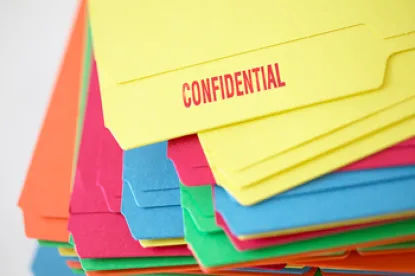The National Labor Relations Board (NLRB) has held under the National Labor Relations Act (NLRA) that employers may maintain and enforce rules requiring confidentiality for the duration of a workplace investigation. Apogee Retail LLC d/b/a Unique Thrift Store, 368 NLRB No. 144 (Dec. 16, 2019).
The NLRB also held that, if the employer’s confidentiality rule extends beyond the duration of the investigation, the employer must show a substantial business justification for that extension.
The decision overruled Banner Estrella Medical Center, 362 NLRB 1108 (2015). Chairman John Ring and Members Marvin Kaplan and William Emanuel were in the majority. Then-Member Lauren McFerran dissented.
Workplace investigations have become a fact of life. Employers find it necessary to conduct sophisticated investigations on a variety of issues, including theft, substance abuse, and harassment, to name a few. The conventional wisdom is that investigations are more effective if they are treated as confidential; witnesses are likely to be more willing to share what they know, and co-conspirators are less able to coordinate their stories.
Banner Estrella
In 2015, in Banner Estrella, the NLRB (comprised entirely of members appointed by President Barack Obama) announced a rule that had the effect of significantly restricting an employer’s ability to keep the details of a workplace investigation confidential.
The employer had instructed its employees not to discuss ongoing workplace investigations with one another. The NLRB held that such an instruction would be lawful only if the employer could establish “that it has a legitimate and substantial business justification that outweighs employees’ Section 7 rights.” Further, an employer could not maintain a rule that required confidentiality in every case. Rather, an employer had to evaluate every investigation separately to determine if special circumstances warranted requiring employees to maintain confidentiality. Moreover, the burden was on the employer to prove its reasons for requiring confidentiality were valid and serious enough to outweigh employee interests in discussing workplace issues. Practically, any employer requirement to keep investigation details confidential would have been found unlawful if challenged.
Apogee Retail Rule
Apogee Retail expressly overrules Banner Estrella. The NLRB used the analysis it announced in The Boeing Company, 365 NLRB No. 154 (2017), for evaluating facially neutral rules that have the potential to interfere with NLRA Section 7 rights.
Boeing established three categories of rules: (1) those deemed to be lawful; (2) those that require case-by-case scrutiny, weighing the employer’s interest against the impact on Section 7 rights to determine legality; and (3) those that are designated unlawful on their face. (For more details about the Boeing decision, see our article, Labor Board Clarifies Boeing Work Rules Decision, Finds Confidentiality, Media Contact Rules Lawful.)
Applying Boeing, the Board recognized the substantial interest employers and employees have in keeping investigation details confidential. The NLRB explained that the most compelling reasons for confidentiality are:
-
The ability to give employee witnesses assurances that their identity will not be disclosed;
-
To ensure the integrity of the investigation;
-
To preserve evidence;
-
To encourage prompt reporting of safety, harassment, and other issues; and
-
To protect personal information.
The Board noted that confidentiality is so valued in the investigative process that it, the Equal Employment Opportunity Commission (EEOC), and the Occupational Safety and Health Administration (OSHA) take steps to preserve confidentiality during their investigations. In fact, the EEOC states in its enforcement guidance that employers should assure employees who participate in employer harassment investigations that confidentiality will be protected.
The Board struck a new balance: the benefits of maintaining confidentiality during an ongoing investigation are substantial and predictable and outweigh Section 7 rights. However, the NLRB also held that the interest in confidentiality does not necessarily outweigh Section 7 rights after the investigation is concluded.
The NLRB issued the following guidance:
-
If the employer’s rule requiring employees to keep investigatory details confidential is expressly limited to the duration of the investigation, the rule is a Category 1 rule under Boeing and is lawful.
-
If the rule extends the confidentiality requirement beyond the closing of the investigation, the rule is a Category 2 rule under Boeing, and the employer must show some justification for extending the confidentiality requirement that outweighs Section 7 rights.
Investigative policies and procedures should be modified to clearly require confidentiality only for the duration of an ongoing investigation and to reserve the right to extend the requirement after the investigation is concluded, when legitimate justification exists.






 />i
/>i

